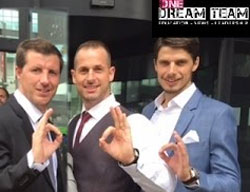Steinkeller bros paid Eliminalia €38K to hide OneCoin fraud
 Aron, Stephan and Christian Steinkeller have been outed as clients of the Eliminalia reputation management agency.
Aron, Stephan and Christian Steinkeller have been outed as clients of the Eliminalia reputation management agency.
Eliminalia is notoriously known for their blackhat approach to “erasing” their client’s past.
The Steinkellers were outed as Eliminalia clients via a leaked documents obtained by Forbidden Stories.
Forbidden Stories cite themselves as a
network of journalists whose mission is to protect, pursue and publish the work of other journalists facing threats, prison, or murder.
 Eliminalia is a Spanish company run by founder Diego “Didac” Sanchez (right)
Eliminalia is a Spanish company run by founder Diego “Didac” Sanchez (right)
Thankfully the Steinkellers or Eliminalia didn’t resort to prison or murder. Instead they targeted coverage of their illegal exploits via threats and manipulation.
The Steinkellers were top earners in the notorious $4 billion dollar OneCoin Ponzi scheme.
The brothers promoted the scam through “One Dream Team” branding.
 In 2021 news broke that the Steinkellers had been indicted in Italy on OneCoin related charges.
In 2021 news broke that the Steinkellers had been indicted in Italy on OneCoin related charges.
That same year a shell company paid Eliminalia €38,000 euros on the Steinkellers’ behalf.
As reported by Forbidden Stories, tactics used by Eliminalia include:
- impersonating European Union officials;
- abusing GDPR laws; and
- filing bogus DMCA claims (supported by fabricated backdated articles)
Based on the data they’ve reviewed, Forbidden Stories claims Eliminia successfully removed articles from “hundreds of journalists” between 2015 and 2021.
Eliminalia claims its services remove “unwanted and erroneous information” for clients with a “right to be forgotten,” but nearly 50,000 internal company documents leaked to Forbidden Stories contradict this narrative.
The files show how Eliminalia worked for scammers, spyware companies, torturers, convicted criminals, corrupt politicians and others in the global underworld to hide public-interest information.
Previous reporting, including by Rest of World, identified some of Eliminalia’s clients – but this leak, which includes confidential emails, client names, contracts and other legal documents – gives a fuller understanding of the opaque company’s operations.
In addition to targeting legitimate media coverage of his clients,
Sánchez and his business partner José María Hill Prados also run at least 50 companies globally, including a surrogacy company facing litigation for child trafficking.
Outfits like Eliminalia are able to do what they do due to outdated DMCA laws and well-intentioned but asinine European GDPR laws.
Data protection laws, Eliminalia and other firms realized, could be weaponized to remove content from the internet. Two laws – the Digital Millennium Copyright Act (DMCA) and GDPR – were easily exploitable.
As part of the coverage of the leaked Eliminalia files, OCCRP reached out to the Steinkellers for comment. They declined.
Forbidden Stories reached out to Eliminalia for comment. They also declined.
Upon learning of pending coverage of their exploits, Eliminalia quickly rebranded as Idata Protection.
Company filings reviewed by Forbidden Stories confirm the rebrand, possibly resulting from investigations by journalists and researchers that generated negative press.
But when two members of the consortium visited the office, an employee said, “the company is called Idata Protection, but we belong to Eliminalia.”
Sánchez, the founder, was no longer in Barcelona, according to the employee.
If you’re wondering whether BehindMLM was targeted by the Steinkellers and Eliminalia, I do recall receiving some GDPR nonsense related to the Steinkellers.
Although they’ve mostly dried up, scammers in Europe still sometimes try on the ruse. I only keep correspondence sent by lawyers so if what I’m remembering was sent by Eliminalia, it would have been cookie-cutter enough for me to just respond to and delete.
I did note one July 2021 notice archived on Lumen Database. Sent from “Global News” and filed as a bogus DMCA notice against BehindMLM’s original reporting on the Steinkellers abandoning OneCoin, I believe this is probably the work of Eliminalia.
For reference, BehindMLM unilaterally declines to act on any bogus GDPR requests.


Hat tip to Melanie for the heads up!
@Oz
Thank you very much. I pass on the praise to the two journalists who wrote the newspaper article:
Vicky Isabelle Bargel and Luisa Hommerich.
share-your-photo.com/4bf65f2570
The articles of the tageszeitung.it are also still readable:
share-your-photo.com/a49ab93511
tageszeitung.it/2022/10/06/straffreiheit-fuer-krypto-queen/
tageszeitung.it/2021/08/08/anklage-im-fall-onecoin/
tageszeitung.it/2022/05/09/die-unauffindbare/
All of the articles mentioned the Steinkeller Brothers and their role in the OneCoin scam.
Aron Steinkeller in the fraud center in Sofia to the right of Ruja Ignatova. On the left Anton “Toni” Federspiel and on the far right Ralf Paulick.
share-your-photo.com/de196423b0
youtube.com/watch?v=c3THcRw0ROE
Here, Aron Steinkeller and Ruja Ignatova celebrate the merger of CONLIGUS (scam) and OneCoin (scam):
share-your-photo.com/3f3c8164e7
Here, Aron Steinkeller and Ruja Ignatova travel together to a con event in Frankfurt am Main:
share-your-photo.com/d7883e81da
Screenshot from November 2016:
share-your-photo.com/82d9ee9087
The dark-skinned man in the picture is the singer Haddaway. His most famous title was “What is love”.
will any of these POS scammers answer for their theft??????????? Probably not! I am so sick of all these habitual scammers that continue to get away this sh*t!
The German networker magazine netcoo.com, which has always reported on the OneCoin scam in an extraordinarily positive way, does not delete comments about the Steinkeller Brothers either.
Here is an example from May 2017:
share-your-photo.com/676f590be8
netcoo.com/direct-selling/raus-bei-onecoin-als-multi-millionaere-kehren-die-steinkeller-brueder-der-network-marketing-branche-den-ruecken/
Invitation to a fraud event on January 9, 2016 in Frankfurt am Main. Aron Steinkeller, Ralf Paulick, Udo Carsten Deppisch, Kari Wahlroos and Ruja Ignatova will be shown.
share-your-photo.com/39e3d5d927
direct-selling-magazine.de/todesstoss-fuer-onecoin-bafin-untersagt-geschaefte-mit-onecoins/
The same topic with reference to BehindMLM in a video:
share-your-photo.com/0c7c9f27fa
youtube.com/watch?v=x4XV6MNGx5s
The title of the video contains a spelling mistake. It should correctly read: ELIMINALIA.
Invitation to a OneCoin event in Mexico from January 2017 with the following scammers:
Christian Steinkeller – Jose Gordo – Mariana Lopez de Waard –
Rodolfo Rodriguez – Esteban Merizalde – Omar Villalobos and Ivan Rodriguez
share-your-photo.com/b49157de3b
facebook.com/photo/?fbid=474244569630216&set=ecnf.100011340309908
Where is Jose Gordo nowadays and is he still wanted in Argentina?
Gordo is still wanted in Argentina. He was promoting the WeWe Global Ponzi last I checked.
@Stevie
Jose Antonio Gordo Valero had founded his company MASTERMIND ENTERPRISES INC. in the money laundering paradise Panama. Remember the scandal about the so-called “Panama papers” of Mossack Fonseca.
Mossack refers to the German lawyer Jürgen Mossack.
share-your-photo.com/d73491a098
Thanks for that. Not what I wanted to hear although it’s good that he is still wanted.
Those people picked up in Argentina for OneCoin scamming have been languishing behind bars for nearly two years now awaiting trial. That must keep Gordo awake at night.
Sorry for him. Not. He is a fugitive.
In other news, variety.com added the gem “Dr. Ruja Ignatova is the only scammer who is on both the FBI and Interpol’s 2022 Ten Most Wanted Lists”.
The Republic of Bulgaria must be so proud that they once managed to export a female who became famous for something else than stripping
OneCoin scammer Ivan Rodriguez from Mexico mentioned in comment #12 has his own website:
onelife.eninfinitum.mx
His contact details:
share-your-photo.com/f29e9f69c3
His YouTube channel is Criptomoneda Mexico with these contact details:
share-your-photo.com/b6900563c1
youtube.com/@criptomonedamexico4291/about
Ivan Rodriguez OneLife SupremeTeam (left) and Jose Gordo in February 2017:
share-your-photo.com/f88a9bf757
facebook.com/photo/?fbid=496433510744655&set=ecnf.100011340309908
Jose Gordo reinvented himself as a coach. See this comment
behindmlm.com/companies/wewe-global-launches-lfi-as-lyo-ponzi-token-collapses/#comment-464155